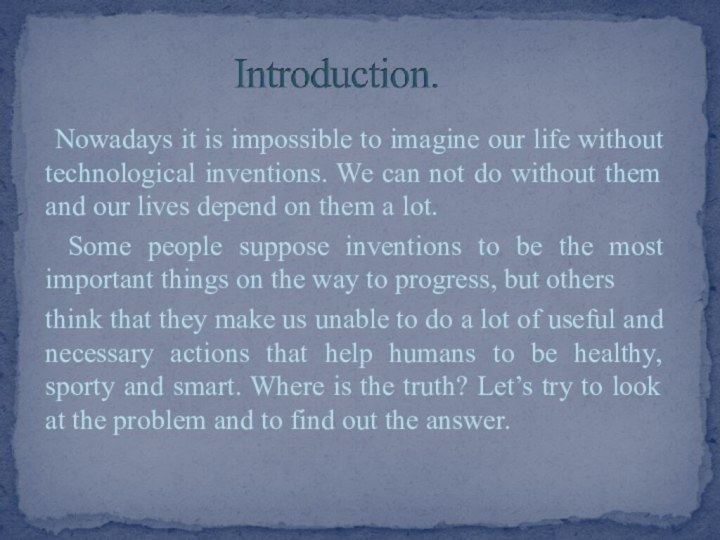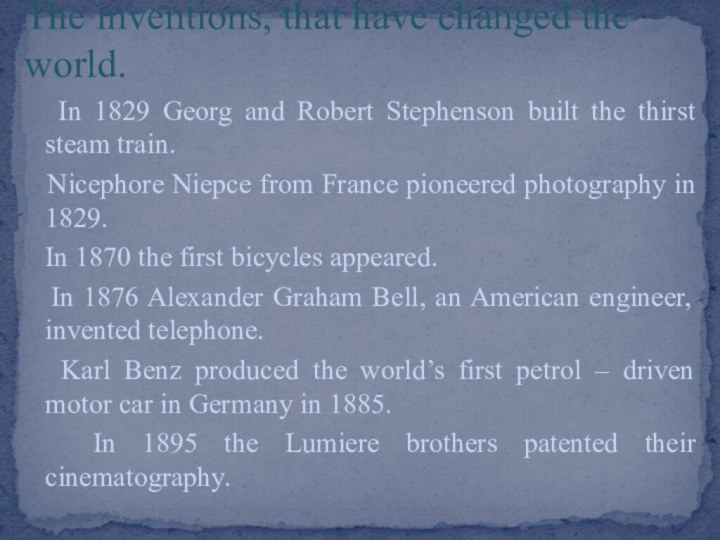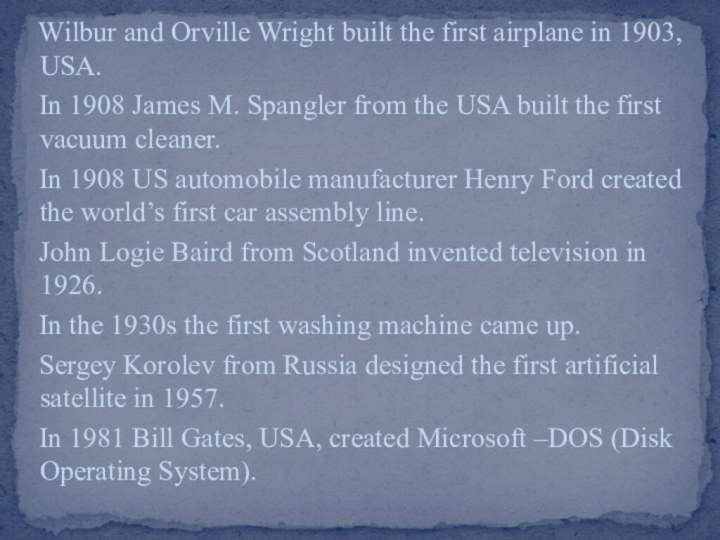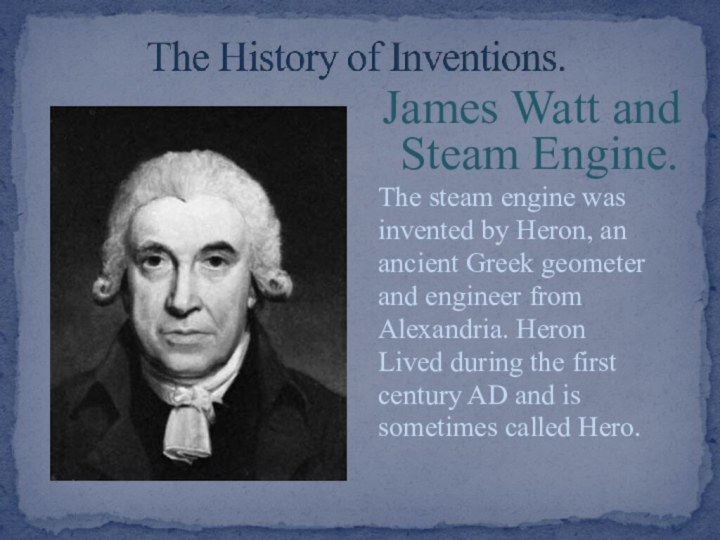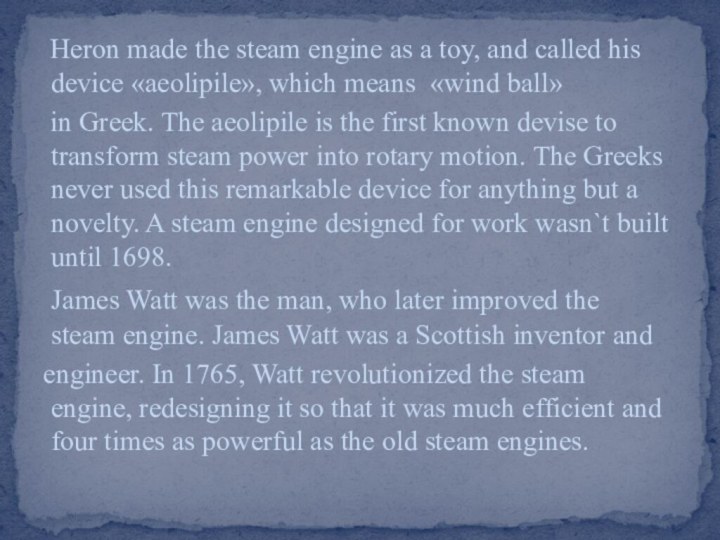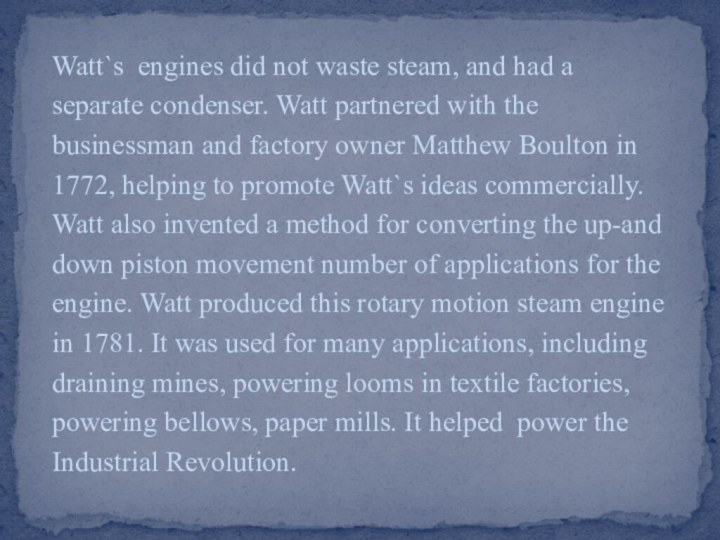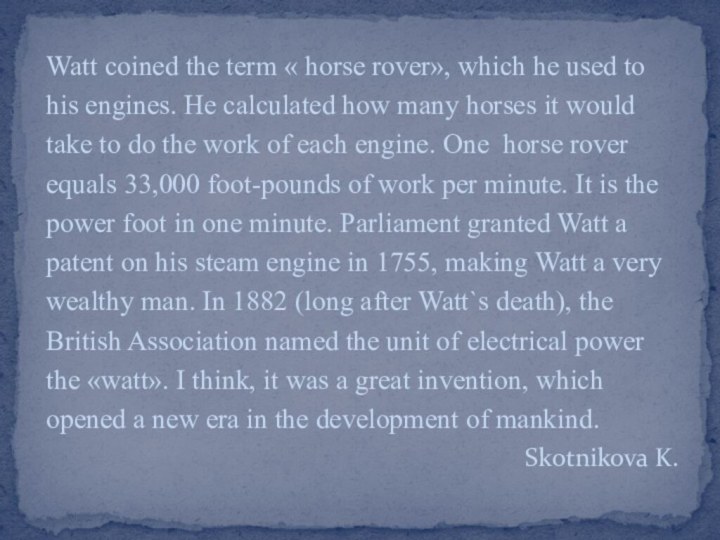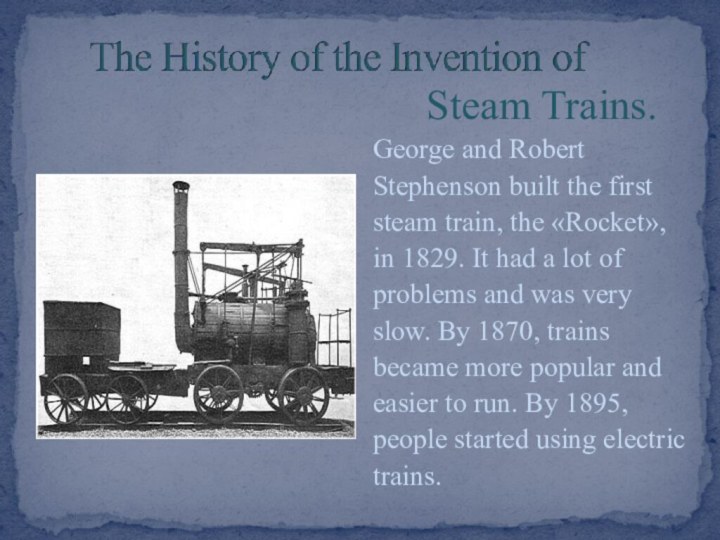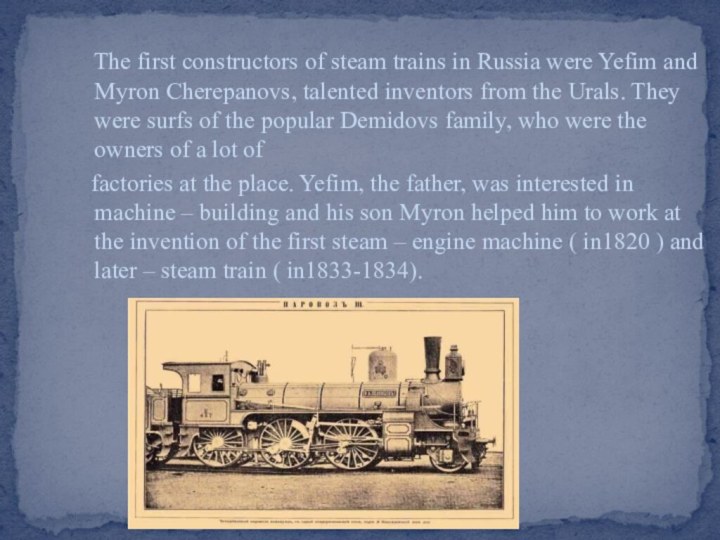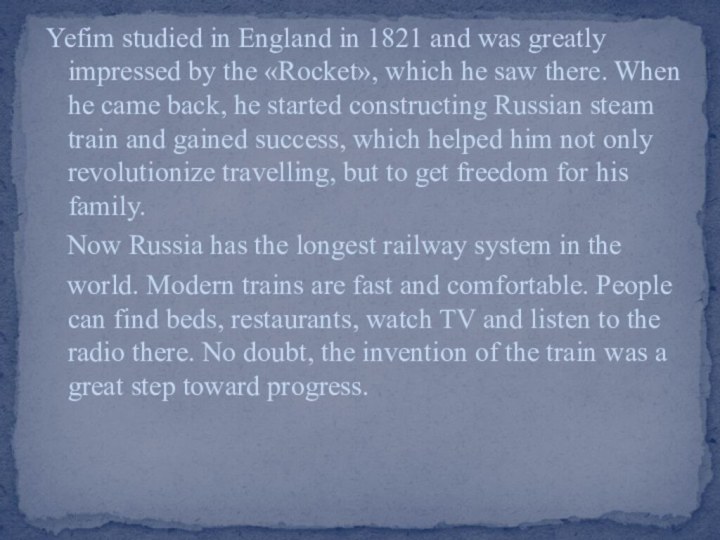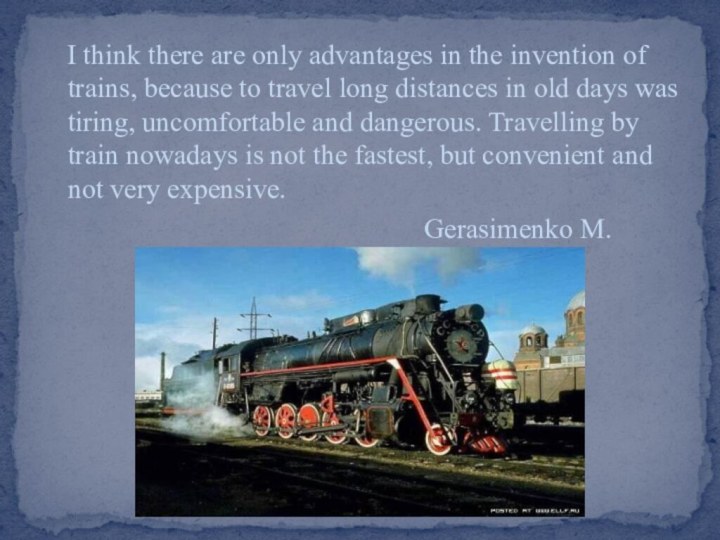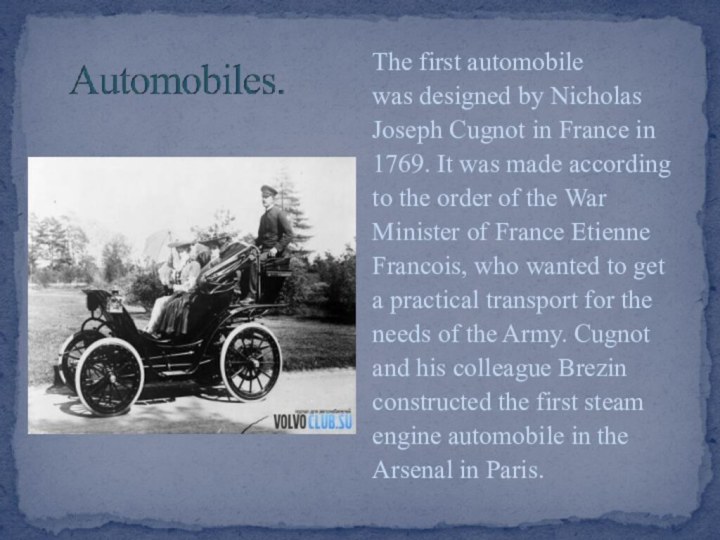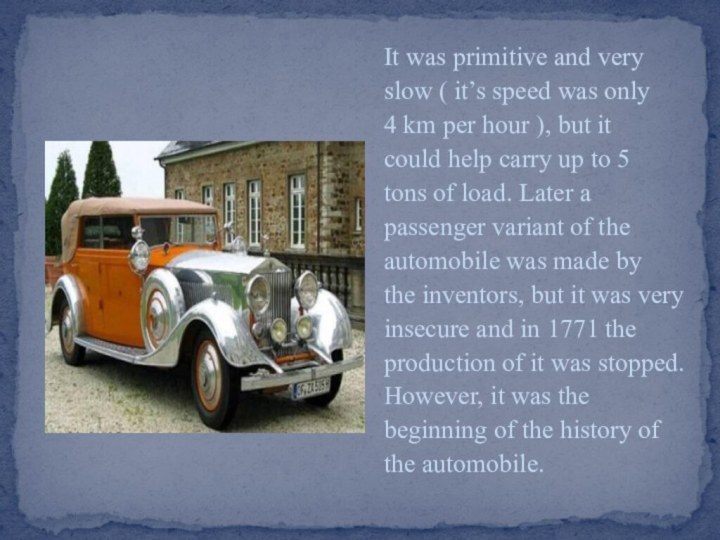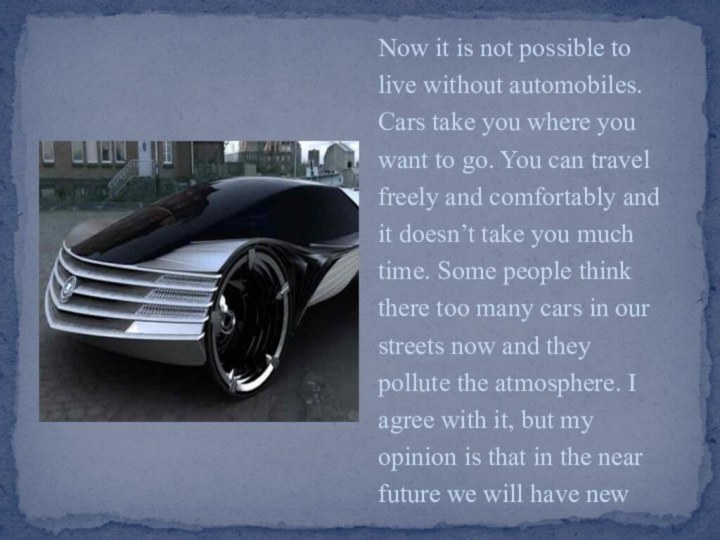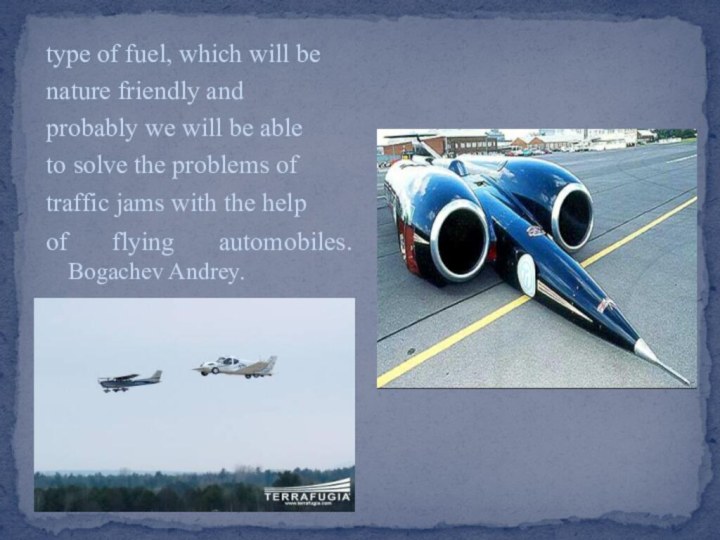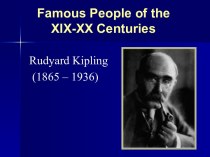Слайд 2
Nowadays it is impossible to imagine
our life without technological inventions. We can not do
without them and our lives depend on them a lot.
Some people suppose inventions to be the most important things on the way to progress, but others
think that they make us unable to do a lot of useful and necessary actions that help humans to be healthy, sporty and smart. Where is the truth? Let’s try to look at the problem and to find out the answer.
Слайд 3
In 1829 Georg and Robert Stephenson
built the thirst steam train.
Nicephore Niepce from
France pioneered photography in 1829.
In 1870 the first bicycles appeared.
In 1876 Alexander Graham Bell, an American engineer, invented telephone.
Karl Benz produced the world’s first petrol – driven motor car in Germany in 1885.
In 1895 the Lumiere brothers patented their cinematography.
The inventions, that have changed the world.
Слайд 4
Wilbur and Orville Wright built the
first airplane in 1903, USA.
In 1908 James
M. Spangler from the USA built the first vacuum cleaner.
In 1908 US automobile manufacturer Henry Ford created the world’s first car assembly line.
John Logie Baird from Scotland invented television in 1926.
In the 1930s the first washing machine came up.
Sergey Korolev from Russia designed the first artificial satellite in 1957.
In 1981 Bill Gates, USA, created Microsoft –DOS (Disk Operating System).
Слайд 5
James Watt and Steam Engine.
The
steam engine was
invented by Heron, an
ancient Greek geometer
and engineer
from
Alexandria. Heron
Lived during the first
century AD and is
sometimes called Hero.
Слайд 6
Heron made the steam engine as
a toy, and called his device «aeolipile», which means
«wind ball»
in Greek. The aeolipile is the first known devise to transform steam power into rotary motion. The Greeks never used this remarkable device for anything but a novelty. A steam engine designed for work wasn`t built until 1698.
James Watt was the man, who later improved the steam engine. James Watt was a Scottish inventor and
engineer. In 1765, Watt revolutionized the steam engine, redesigning it so that it was much efficient and four times as powerful as the old steam engines.
Слайд 7
Watt`s engines did not waste steam, and had
a
separate condenser. Watt partnered with the
businessman and factory owner
Matthew Boulton in
1772, helping to promote Watt`s ideas commercially.
Watt also invented a method for converting the up-and
down piston movement number of applications for the
engine. Watt produced this rotary motion steam engine
in 1781. It was used for many applications, including
draining mines, powering looms in textile factories,
powering bellows, paper mills. It helped power the
Industrial Revolution.
Слайд 8
Watt coined the term « horse rover», which
he used to
his engines. He calculated how many horses
it would
take to do the work of each engine. One horse rover
equals 33,000 foot-pounds of work per minute. It is the
power foot in one minute. Parliament granted Watt a
patent on his steam engine in 1755, making Watt a very
wealthy man. In 1882 (long after Watt`s death), the
British Association named the unit of electrical power
the «watt». I think, it was a great invention, which
opened a new era in the development of mankind.
Skotnikova K.
Слайд 9
Steam Trains.
George and Robert
Stephenson built
the first
steam train, the «Rocket»,
in 1829. It had a
lot of
problems and was very
slow. By 1870, trains
became more popular and
easier to run. By 1895,
people started using electric
trains.
Слайд 10
They were cleaner and quieter than steam trains.
By 1920, most countries in Europe had railways. Today
there are railways all over the world. They have greatly changed our lives and helped to save a lot of time for travellers.
Слайд 11
The first constructors of steam trains
in Russia were Yefim and Myron Cherepanovs, talented inventors
from the Urals. They were surfs of the popular Demidovs family, who were the owners of a lot of
factories at the place. Yefim, the father, was interested in machine – building and his son Myron helped him to work at the invention of the first steam – engine machine ( in1820 ) and later – steam train ( in1833-1834).
Слайд 12
Yefim studied in England in 1821 and was
greatly impressed by the «Rocket», which he saw there.
When he came back, he started constructing Russian steam train and gained success, which helped him not only revolutionize travelling, but to get freedom for his family.
Now Russia has the longest railway system in the
world. Modern trains are fast and comfortable. People can find beds, restaurants, watch TV and listen to the radio there. No doubt, the invention of the train was a great step toward progress.
Слайд 13
I think there are only advantages
in the invention of trains, because to travel long
distances in old days was tiring, uncomfortable and dangerous. Travelling by train nowadays is not the fastest, but convenient and not very expensive.
Gerasimenko M.
Слайд 14
The first automobile
was designed by Nicholas
Joseph Cugnot in
France in
1769. It was made according
to the order of
the War
Minister of France Etienne
Francois, who wanted to get
a practical transport for the
needs of the Army. Cugnot
and his colleague Brezin
constructed the first steam
engine automobile in the
Arsenal in Paris.
Слайд 15
It was primitive and very
slow ( it’s speed
was only
4 km per hour ), but it
could help
carry up to 5
tons of load. Later a
passenger variant of the
automobile was made by
the inventors, but it was very
insecure and in 1771 the
production of it was stopped.
However, it was the
beginning of the history of
the automobile.
Слайд 16
Now it is not possible to
live without automobiles.
Cars
take you where you
want to go. You can travel
freely
and comfortably and
it doesn’t take you much
time. Some people think
there too many cars in our
streets now and they
pollute the atmosphere. I
agree with it, but my
opinion is that in the near
future we will have new
Слайд 17
type of fuel, which will be
nature friendly and
probably
we will be able
to solve the problems of
traffic jams
with the help
of flying automobiles. Bogachev Andrey.

